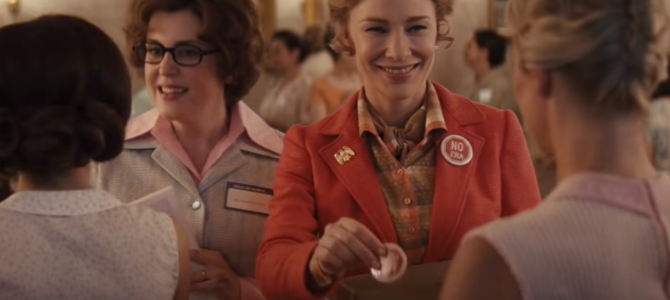“Mrs. America” producers might be surprised. If they tried to dim the bright legacy of Phyllis Schlafly, their efforts fell flat.
Schlafly, portrayed by Cate Blanchett, is smart, steely, and, most importantly, victorious. This is a show set in the thick of the Equal Rights Amendment fight of the early 1970s, defined by its three heroines: Schlafly, Gloria Steinem, and Shirley Chisholm. But only one comes out a winner. Meet the misses, folks.
Far from being a platitudinous and dopey look at the women’s movement through a liberal lens, the series is likely the coolest thing you’ll binge in quarantine. The show has a number of artful touches that keep it light and easy like a ’70s sitcom: the music, set design, and conversation transport you to the political strife of the time, but doesn’t make good girls and bad girls of the warriors.
There are, however, housewives versus radical feminists, but each are given their fair share of sympathy, I found. The latter are even poked with a few zingers like, “Nobody likes feminists. Not even liberals.” The show makes abundantly clear you’d rather be in a room with a Republican housewife than Betty Friedan. In fact, you’d rather be with anyone than Friedan. She is painted as the grumpy aunt of the tribe while Bella Abzug gets points for her level pragmatism.
Steinem, though glamorous, is a like a lost sheep in the feminist wilderness, trying to stay true to herself, but manipulated by her peers and the party bosses. Chisholm, it appears, is the only one with a true compass on their team.
Then there’s Schlafly. Liberals will like this series because they are too intoxicated by their own smugness to see Blanchett’s nuanced treatment of her. Sure, she’s an ice goddess. She’s as unflappable as her tidy wardrobe and cupboards. But Blanchett gives her glimmers of kindness and insight—the qualities that make an extraordinary leader.
That’s what this story is really all about, leadership and the wielding of power, which brings me to the current political landscape. The events of 1972 portend badly for the left of 2020.
Picture it: the Democratic National Convention in Miami where this story finds its apex. While the ERA debate rages on, the feminist crew has an even bigger mandate—seeing their issues, and their candidate Shirley Chisholm, on the party ticket. The party is fragmented between left-wing Chisholm, who hangs on to a sliver of delegates, and the far safer choice, George McGovern, a decent but befuddled establishment favorite. Sounding a little familiar?
We see behind-the-scenes machinations to keep abortion off the platform, how Chisholm’s hand is forced to give up delegates, and how everybody grits their teeth through compromises. What we don’t see is what happened that year—McGovern going down in disastrous defeat, and the ERA being declared DOA.
Phyllis Schlafly gets the last laugh, or in her case, the last Mona Lisa smile. This is a series worth watching—and worth learning from.









